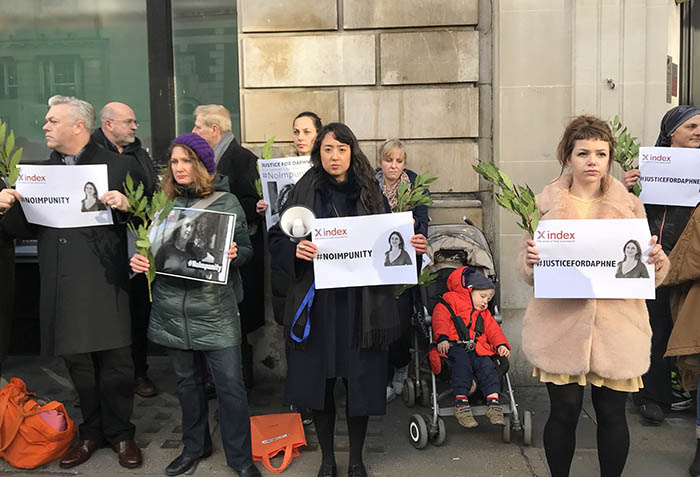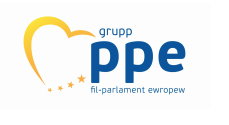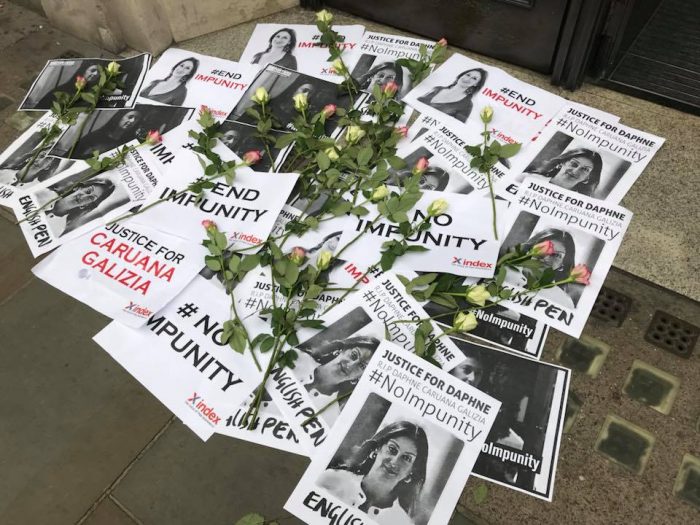Index relies entirely on the support of donors and readers to do its work.
Help us keep amplifying censored voices today.
[vc_row][vc_column][vc_column_text]
Yesterday marked three months since the murder of Maltese journalist Daphne Caruana Galizia.
Gathering outside the Maltese embassy in Malta House, London, members from Index on Censorship stood with seven other free speech and criminal justice organisations to mark the anniversary and call on the Maltese government to ensure justice is served. I spoke with Hannah Machlin, project manager for Index on Censorship’s Mapping Media Freedom platform, Cat Lucas, programme manager for English Pen’s Writers at Risk programme, and Rebecca Vincent, UK bureau director for Reporters Without Borders for this special podcast.
During the vigil, participants left bay leaves — which in Greek mythology are a sign of bravery and strength — outside the embassy in a sign of solidarity with supporters in Malta, while a statement from Caruana Galizia’s family was read out.

Caruana Galizia was killed on 16 October 2017 when a bomb placed under her car exploded as she was leaving her home in Bidnija, Malta. Sixteen days prior to the fatal attack, Caruana Galizia filed a police report saying she was being threatened.
Through her investigative journalism career, Caruana Galizia exposed corrupt politicians and other officials, uncovering a number of corruption scandals in the Panama Papers. Caruana Galizia also investigated links between Maltese Prime Minister Joseph Muscat to secret offshore bank accounts, to allegedly hide payments from Azerbaijan’s ruling family. Her work on government corruption also led to early elections in Malta in June 2017.
At the time of her death, Caruana Galizia was subject to several libel suits and counts of harassment. Her assets were frozen in February 2017 following a request filed by Economic Minister Chris Cardona and his EU presidency policy officer Joseph Gerada.
Her murder was condemned by many from the international community, with a previous vigil held on the International Day to End Impunity for Crimes Against Journalists, where nearly 60 free expression advocates gathered, calling for justice and an open and transparent investigation into her death.
Malta is currently ranked 47th out of 180 countries in Reporters Without Borders’ 2017 World Press Freedom Index, and 47th out of 176 countries in Transparency International’s Corruption Perception Index 2016.
Seven reports of violations of press freedom were verified in Malta in 2017, according to Index on Censorship’s Mapping Media Freedom project. Five of those are linked to Caruana Galizia and her family.[/vc_column_text][/vc_column][/vc_row][vc_row][vc_column][vc_basic_grid post_type=”post” max_items=”4″ element_width=”6″ grid_id=”vc_gid:1516205516926-5b43be63-70a3-7″ taxonomies=”18782″][/vc_column][/vc_row]
[vc_row][vc_column][vc_column_text]
Around seven free expression and anti-corruption groups, and other supporters gathered in London today to remember investigative journalist Daphne Caruana Galizia three months after her tragic murder in Malta, and to reiterate calls for justice in her case.
Caruana Galizia was killed on 16 October 2017 when a bomb placed under her car exploded as she drove away from her home in Bidnija, Malta. A specialist in investigating corruption, her work included exposés of the shady secret deals, uncovered in the Panama Papers, that show how politicians and others hide illicit wealth behind secret companies. Her allegations about governmental corruption led to early elections in the country in June 2017.
“We gathered to honour a remarkable woman and courageous investigative journalist. We gathered to show the Maltese authorities and the international community that we will not forget Daphne Caruana Galizia, and we will not rest until all those who planned and carried out her attack are brought to justice. We gathered in support of the very principle of press freedom, as an attack against a journalist anywhere is an attack on journalism itself,” said Rebecca Vincent, UK Bureau Director for Reporters Without Borders.
“The corruption Daphne Caruana Galizia exposed affects people across Europe, and as Europeans, we must show solidarity with her family and stand up for the truth. Justice requires not just punishing those guilty of her murder, but also ensuring that her investigations are widely read, both in Malta and across Europe. European leaders must come together to ensure there is no impunity in this case. If not, they send a chilling message that those standing against corruption may be silenced,” said Katie Morris, Head of Europe and Central Asia for Article 19.
“Until all the perpetrators, including possible masterminds, behind the murder of Daphne Caruana Galizia are fully prosecuted, journalists in Malta will work in fear. The UK government must do all it can to ensure this case receives the attention it requires and that, like so many other cases of journalists murdered around the world, justice is not denied,” said Elisabeth Witchel, Impunity Campaign Consultant for the Committee to Protect Journalists.
“Today we come together to pay tribute to Daphne Caruana Galizia and to stand in solidarity with her family. Daphne’s murder was an attempt to silence her but we will not allow that to happen. We will continue to share her words and her work, and to call for a full and impartial investigation into her death,” said Antonia Byatt, Interim Director, English Pen.
“Daphne Caruana Galizia’s heinous murder has cemented a new climate of fear and uncertainty for journalists, threatening the future of free speech in Malta. On the three-month anniversary of Caruana Galizia’s death, we remember her brave and vital work which continues to hold the Maltese authorities accountable. We hope the arrests of her alleged attackers are the run-up to an independent and fair trial to ensure this will not be a grave case of impunity,” said Hannah Machlin, Mapping Media Freedom Project Manager for Index on Censorship.
“Daphne Caruana Galizia’s reporting courageously exposed organised crime and political corruption in Malta. It is vital not only that her terrible murder be fully investigated and those responsible be brought to justice, but also that her legacy in Malta continues, and that corruption and impunity there be rooted out. By gathering to remember her today, we reiterate that those who expose corruption should be protected, not intimidated”, said Patricia Moreira, Managing Director, Transparency International.
Co-sponsors of the London vigil included ARTICLE 19, the Committee to Protect Journalists, English Pen, Index on Censorship, Pen International, Reporters Without Borders, and Transparency International. Participants read a statement from Caruana Galizia’s family and wrote messages on bay leaves in solidarity with her supporters in Malta.
Malta is ranked 47th out of 180 countries in Reporters Without Borders’ 2017 World Press Freedom Index, and 47th out of 176 countries in Transparency International’s Corruption Perception Index 2016.[/vc_column_text][/vc_column][/vc_row][vc_row][vc_column][vc_basic_grid post_type=”post” max_items=”4″ element_width=”6″ grid_id=”vc_gid:1516117019985-986a456a-54fe-4″ taxonomies=”18782″][/vc_column][/vc_row]
[vc_row][vc_column][vc_column_text] MEPs David Casa (EPP), Ana Gomes (S&D), Monica Macovei (ECR), Maite Pagazaurtundúa (ALDE) Stelios Kouloglou (GUE) and Benedek Jávor (Greens) have joined forces to push for EU legislation that will address and end “SLAPPs” – lawsuits intended to intimidate and silence investigative journalists and independent media by burdening them with exorbitant legal expenses until they abandon their opposition. According to the MEPs, the practice is abusive, poses a threat to media freedom and has no place in the European Union.
MEPs David Casa (EPP), Ana Gomes (S&D), Monica Macovei (ECR), Maite Pagazaurtundúa (ALDE) Stelios Kouloglou (GUE) and Benedek Jávor (Greens) have joined forces to push for EU legislation that will address and end “SLAPPs” – lawsuits intended to intimidate and silence investigative journalists and independent media by burdening them with exorbitant legal expenses until they abandon their opposition. According to the MEPs, the practice is abusive, poses a threat to media freedom and has no place in the European Union.
SLAPP was used, for instance, against investigative journalist Daphne Caruana Galizia and is now being used against Maltese media houses by firms associated with government corruption and the Panama Papers scandal that are threatening legal action in the United States. David Casa, Ana Gomes, Monica Macovei, Maite Pagazaurtundúa, Stelios Kouloglou and Benedek Jávor stated: “In Malta we have seen that firms like Pilatus Bank and Henley & Partners that employ these practices, using American litigation, have succeeded in having stories altered or deleted completely from online archives. And investigative journalists are prevented from reporting further on corrupt practices out of fear of further legal action. But this is not just a Maltese problem. In the UK, Appleby, the firm associated with the Paradise Papers, is using similar tactics against the Guardian and the BBC.
The cross-border nature of investigative journalism as well as the tendency to pursue legal action in jurisdictions outside the EU that only have a tenuous connection with the parties justifies and requires an EU response”.
The MEPs are calling on EU Commissioner Frans Timmermans to propose an EU anti-SLAPP directive that will include:
• The ability for investigative journalists and independent media to request that vexatious lawsuits in the EU be expediently dismissed and claim compensation;
• The establishment of punitive fines on firms pursuing these practices when recourse is made to jurisdictions outside the EU;
• The se]ng up of a SLAPP fund to support investigative journalists and independent media that choose to resist malicious a^empts to silence them and to assist in the recovery of funds due to them;
• The setting-up of an EU register that names and shames firms that pursue these abusive practices.
“We are committed to the protection of investigative journalists and media freedom across the EU and will pursue this issue until anti-SLAPP EU legislation is in place,” the MEPs stated.
Thomas Gibson from the Committee to Protect Journalists stated: “SLAPP is a serious threat to journalism and media freedom. These sums of money are in no way proportionate.
Independent journalists in Malta already face enormous challenges and restrictions. critical journalism must not be stifled. In addition to pushing for full justice of the murder of Daphne Caruana Galizia, the Commission needs to address the climate in which investigative journalists work in the country.”
Jodie Ginsberg, CEO of Index on Censorship, said: “Having a media that is free to investigate corruption and abuse of power – and free to publish the results of those investigations – is fundamental to democracy. These vexatious lawsuits – deliberately aimed at preventing journalists from carrying out such work – must be stopped.”[/vc_column_text][/vc_column][/vc_row][vc_row][vc_column][vc_basic_grid post_type=”post” max_items=”4″ element_width=”6″ grid_id=”vc_gid:1516372688389-8d5f3054-b08d-10″ taxonomies=”1682, 14259, 18781″][/vc_column][/vc_row]
[vc_row][vc_column][vc_column_text] Doughty Street Chambers has surfaced concerns about the investigation being carried out by Maltese authorities into the death of Daphne Caruana Galizia, a journalist, writer and anti-corruption activist murdered on 16 October when her car exploded.
Doughty Street Chambers has surfaced concerns about the investigation being carried out by Maltese authorities into the death of Daphne Caruana Galizia, a journalist, writer and anti-corruption activist murdered on 16 October when her car exploded.
In its urgent legal advice to the family of Galizia, Doughty Street Chambers, an international specialist law firm, raised issues around the independence of the investigation, which they said was in a “clear and serious breach of Article 2” of the European Convention on Human Rights, which guarantees an effective investigation.
Doughty Street barristers Caoilfhionn Gallagher QC and Jonathan Price said “we are of the firm view that Malta is in flagrant violation of the Article 2 investigative duty and thus in breach of its obligations under the ECHR”, and that “from the information available at this stage it appears highly likely to us that the Maltese authorities have also violated other human rights of Ms Caruana Galizia and the bereaved family, under Articles 2, 3, 8, 10 and/ or 13 ECHR (and indeed under other international human rights treaties and domestic law).”
A further requirement of Article 2 is that the investigation should safeguard the legitimate interests of the next of kin. However, Galizia’s family members have been learning of key developments through grossly inappropriate channels: Twitter accounts belonging to politicians and news headlines.
“The advice from leading legal experts confirms that Malta is in breach of its obligations under European law to investigate the murder of Daphne Caruana Galizia thoroughly and fairly”, said Joy Hyvarinen, head of advocacy at Index on Censorship. “The advice raises extremely serious questions about the Maltese police, and Index believes that external, independent investigators must be appointed urgently.”
The lawyers called for swift action to be taken by the authorities in Malta to immediately remove the deputy commissioner from his role and to apologise to the family “for the failure to appropriately update and involve them in the investigation, and alter the way in which information is provided to them to comply with Article 2’s requirements.”[/vc_column_text][/vc_column][/vc_row][vc_row][vc_column][vc_basic_grid post_type=”post” max_items=”12″ style=”load-more” items_per_page=”4″ element_width=”6″ grid_id=”vc_gid:1512749485797-9de444c0-8566-10″ taxonomies=”18781, 18782″][/vc_column][/vc_row]